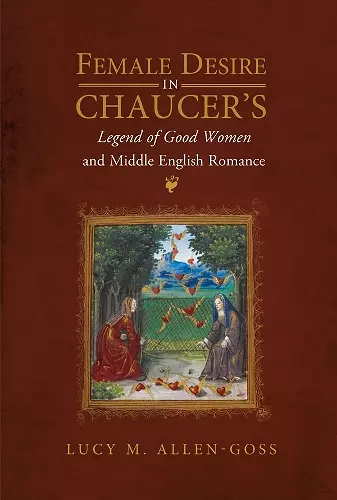Female Desire in Chaucer's Legend of Good Women and Middle English Romance
Format:Hardback
Publisher:Boydell & Brewer Ltd
Published:20th Sep '20
Currently unavailable, and unfortunately no date known when it will be back
This hardback is available in another edition too:
- Paperback£19.99(9781843846796)

An examination of female same-sex desire in Chaucer and medieval romance. In both medieval and modern contexts, women who do not desire men invite awkward silences. Men's dissident sexual practices have been discussed energetically by writers of law and religion, medicine and morality; reams of medieval texts are devoted to horrified or fascinated references to men's deviant intimacies with men. Yet women - despite the best efforts of recent scholars - remain at the margins of this picture, especially in studies of literature. This book aims to re-centre female desire. Identifying a feminine or lesbian hermeneutic in late-medieval English literature, it offers new approaches to medieval texts often denigrated for their omissions and fragmentation, their violence and uneven poetic texture. The hermeneutic tradition Chaucer inherited, stretching from Jerome to Jean de Meun, represents female bodies as blank tablets awaiting masculine inscription, rather than autonomous agents. In the Legend, Chaucer considers the unspoken problem of female desires and bodies that resist, evade, and orient themselves away from such a position. Can women take on hermeneutic authority, that phallic capacity, without rendering themselves monstrous or self-defeating? This question resonates through three Middle English romances succeeding the Legend: the alliterative Morte Arthure, the Sowdone of Babylon, and Undo Your Door. With combative innovation, they repurpose the hermeneutic tradition and Chaucer's use of it to celebrate an array of audacious female desires and embodiments which cross and re-cross established categories of masculine and feminine, licit and illicit, animate and inanimate. Together, these texts make visible the desires and the embodiments of women who otherwise slip out of visibility, in both medieval and post-medieval contexts.
Lucy M. Allen-Goss has given us a book that we need. ...I finished the book even more convinced that Chaucer's text is an essential tool in understanding the development of femininity, female desire, and medieval feminisms. Her applications to other romances demonstrate how this view works outside a Chaucerian framework. * STUDIES IN THE AGE OF CHAUCER *
This study is groundbreaking for its willingness to rethink how overlooked genres-romance and legend-might admit female same-sex desires that are usually proscribed or overwritten. ...I view Allen-Goss's call to consider feminine desire outside or beyond the structures of masculine fantasies as one of the most important interventions in feminist critical thought for late medieval English literary studies. * ARTHURIANA *
Allen-Goss has produced exciting and important work, which makes a convincing case for re-evaluating these understudied texts and their explorations of female desires. -- Hannah Piercy * Nottingham Medieval Studies *
Throughout, Allen-Goss shows how incomprehensible or unspeakable female desire typically and systematically receives articulation vis-à-vis masculine desire. Consequently, her arguments will interest Chaucerians, medievalists, and other scholars of literature and literary theory with special interests in sexuality and gender studies. -- Holly Barbaccia, Georgetown College * Journal of British Studies *
Lucy Allen-Goss's far-ranging and exciting monograph offers a provocative way of recuperating the often-occluded representation of female desire in medieval texts. -- Elizaveta Strakhov * Renaissance Quarterly *
ISBN: 9781843845706
Dimensions: unknown
Weight: 472g
236 pages